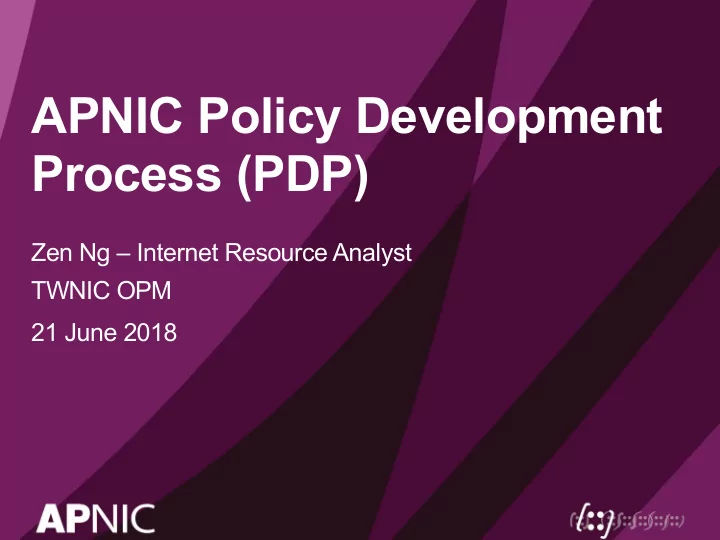

APNIC Policy Development Process (PDP) Zen Ng – Internet Resource Analyst TWNIC OPM 21 June 2018
What is a Policy? In the APNIC region, a policy refers to the rules and requirements or criteria that one must meet to be eligible to receive IP and ASN resources. A policy proposal is a formal, written submission that outlines an idea for a new policy. If a policy proposal is successful it will become a policy.
Why do we need resource policy? IP address and AS numbers are public shared resources. APNIC policies ensure that these resources are managed properly and distributed with the goal of fairness and consistency in mind. The common aim of a policy is to ensure proper usage of Internet number resources according to the technical and operational needs of the network . This is vital for the continued stable growth of the Internet.
Policy change Policies change constantly. They evolve as the needs of the technical community change Good policy relies on a range of opinions APNIC policies are developed by Members and the Internet community in a bottom-up process of consultation and consensus.
What’s APNIC’s role? • The APNIC Secretariat is the organization that manages resources, implements policy and provides a range of services to the community • APNIC staff o Provide information and support to people who want to be involved in the policy development process o Provide support to the Policy SIG o Help authors to draft proposal wording o Manage the implementation of policy changes o Inform the policy changes to the community
Who can Participate? Policies are developed by and for the Asia Pacific Internet community, which includes the APNIC membership. Anyone can participate in the policy development process for managing and distributing IP addresses. • Whether you are a seasoned network engineer, a decision maker, a student in the IT field, or a user of the Internet, you can join the discussion. You are invited to be part of this development process.
Why participate? • It is an opportunity to learn and share experiences and best practices in the Internet • Policies affect your organization’s operating environment and are constantly changing • Ensure your organization's needs are represented • It’s a great way to build your profile and contribute to the Internet • You can directly impact the way APNIC manages Internet number resources • Make these policies work for your networks and future growth
What is a SIG? A SIG, or Special Interest Group, is an open forum for the community to discuss topics of interest. There are no entry requirements to participate in the activity of the APNIC Policy SIG. You don’t “join” a Special Interest Group, you participate in it. The first step to participation is usually to subscribe to the SIG mailing list. Special Interest Group Guidelines https://www.apnic.net/community/participate/sigs/ 8
Policy Special Interest Group (SIG) Charter Develop policies and procedures which relate to the management and use of Internet address resources by APNIC, NIRs, ISPs and other organizations within the Asia Pacific region. 9
APNIC Policy SIG Policy SIG Chair Sumon Ahmed Sabir Secretariat Support Sunny Chendi Co-Chairs George Odagi Bertrand Cherrier Ching-Heng Ku Elected by the Asia Pacific Internet Community
Policy Process What are the key characteristics of the PDP? Anyone in the community - Member or not - can propose a policy. This can be a proposed change to an existing policy or a Open new one altogether. Anyone can participate from the beginning, during the discussion as well as in the decision-making process. APNIC publicly documents all policy discussions and decisions to provide complete transparency of the policy development Transparent process. These documents, the associated discussion in the mailing list, and decisions are freely available for viewing at any time. The Policy Development Process is driven by the Internet Bottom-up community - by those who need and use these resources. It is catered to address the needs and requirements of the Asia- Pacific Internet community. APNIC stays neutral in the process. 11
Policy Development Process There are three main phases of the APNIC policy development process: • Before the meeting • At the meeting • After the meeting
It all starts with a Proposal • Who can propose a policy idea? • Why would you do it? • What is required? • Where do you start? Complete the online form https://www.apnic.net/community/policy/proposals/submit-a- policy-proposal/
Policy SIG Mailing list • Some people think it’s a great idea • Others disagree • The author tries to convince or compromise • The Chairs monitor the discussions and participate as appropriate Join the mailing list https://mailman.apnic.net/mailman/listinfo/sig-policy 14
Chairs consider many sources • Mailing list discussions • Discussions at the SIG meeting – Incl. remote participants • Show of hands – Not a vote, a way of “broadly gauging opinion” – CONFER assists remote participation • Require one-off registration – The Chair will ask for both Have your say remotely https://confer.apnic.net/ 15
What’s next? • Subscribe to the mailing list – sig-policy@apnic.net • Review the proposals – https://www.apnic.net/community/policy/proposals/ • Discuss with others – Morning and afternoon tea, lunch, dinner • Participate in Policy SIG Meeting – Check conference program 16
Current Policy Proposals Current Policy Proposals • prop-118 : No need policy in APNIC APNIC 45 Policy SIG region • prop-119 : Temporary transfers APNIC 44 Policy SIG • prop-120 : Final /8 pool exhaustion plan • prop-123 : Modify 103/8 IPv4 transfer policy • prop-124 : - Clarification on IPv6 Sub-Assignments apnic.net/policy
Next Conference Register now https://conference.apnic.net/46/register/register conference.apnic.net/46 18
Later… APRICOT 2019 / APNIC 47 Daejeon, Republic of Korea 18 to 28 February 2019 APNIC 48 Chiang Mai, Thailand 5 to 12 September 2019
Thanks! blog.apnic.net apnic.net/social 20
Recommend
More recommend